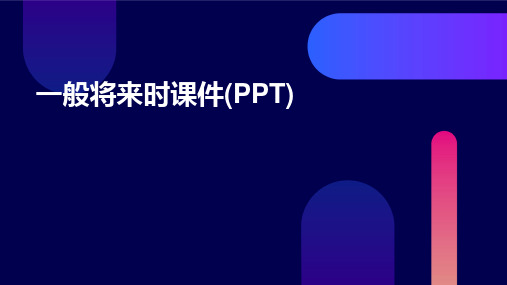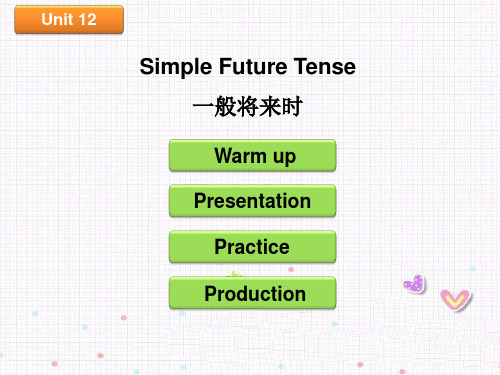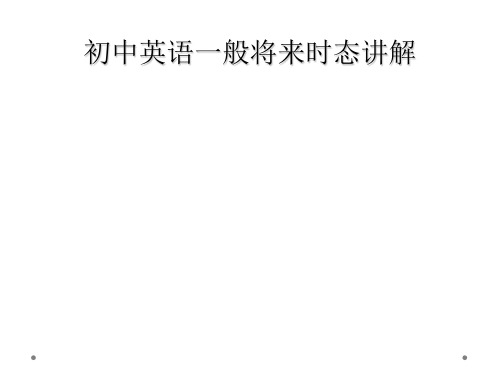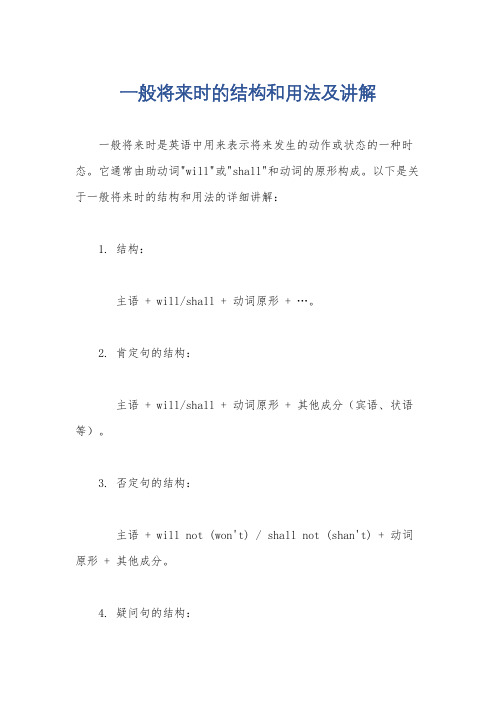英语教学课件系列 一般将来时 will or shall +动词原形 和 形容词more、fewer和less的用法
一般将来时课件(PPT)

“be able to”表示将来有能力做某 事时,使用一般将来时形式,例如“I will be able to help you”。
情态动词如“can”、“may”、 “must”等,在一般将来时中通常直 接加动词原形,例如“I can swim”。
03
一般将来时在句子中的运用
陈述句中的使用
表示将要发生的动作或存在的状态
纠正方法
应使用正确的将来时形式,如 "He will go to the park tomorrow." 或 "He is going to the park tomorrow."
忽略动词变化规则
错误示例
They will play football in the future.(忽略了动词play在将来时中的变化)
纠正方法
在将来时中,应使用正确的助动词或情态动词形式,如 "I will be able to help you with your homework." 或 "I can help you with your homework."
错误示例
He will must finish his work before leaving.(错误地使 用了情态动词must)
作用
用于表示未来的计划、打算、预测、 假设等。
常见表达形式
will + 动词原形
表示将来的动作或状态,如“I will go to the park tomorrow.”(我明天将去公园。)
be going to + 动词原形
表示计划、打算或即将发生的动作,如“I am going to study hard this semester.”(我这 学期打算努力学习。)
一般将来时态讲解(共25张PPT)

• I don't think the test will be very difficult. 。
②用于“祈使句 + and + 陈述句” 中
I don’t think it will rain this afternoon.
I am hungry. I think I’ll have something to eat.
表示看法,观点
“There be”句型的一般将来时 肯定句: There will be +名词+其他成份 [注意]:无论后面加单数名词或复数形式,be都必须用原形。
shall适用于第一人称I,We;而will适用于所有人称。 通常可以用will来代替shall。 will,shall均可缩写为:'ll,如:
I will= I'll; she will = she’ll;will not 和shall not分别可以 缩写为 won't 和shan't。
1.一般将来时的用法
4. be about to + 动词原形。 表示 (1)“即将做”或“马上做”
(2)因此,句子不能再用时间状语。
Don’t leave. Li Lei is about to come. 不要走了,李蕾就要来了。 Be quiet. The concert is about to start. 安静下来,音乐演唱会就要开始了。
• My uncle will come to see me every Saturday.
• 我叔叔每个星期六都会来看我。
• The students will have five English classes per week this term.
小学一般将来时讲解

小学一般将来时讲解1. 介绍小学一般将来时是英语语法中的一种时态,用来表示将来发生的行动或事件。
在这种时态中,动作与时间的关系是相对的,即动作将在将来某一时刻发生。
2. 构成小学一般将来时由情态动词 "will" 或 "shall" 加上动词原形构成。
下面是一些例子:- I will go to school.- She will play basketball.- We shall see a movie.3. 肯定句结构小学一般将来时的肯定句结构是:主语 + will/shall + 动词原形+ 其他。
4. 否定句结构小学一般将来时的否定句结构是:主语 + will/shall + not + 动词原形 + 其他。
5. 疑问句结构小学一般将来时的疑问句结构是:Will/Shall + 主语 + 动词原形+ 其他?6. 使用场景小学一般将来时常用于以下场景:- 表示未来的计划或打算:I will go to the park tomorrow.- 表示预测:It will rain later.- 表示意愿或请求:Will you help me with my homework?7. 注意事项在小学一般将来时中,我们要注意以下几点:- 不使用"will"或"shall"来表达对他人的承诺或决定,如"I promise"或"I decide"。
- 在口语中,经常使用"will"而不是"shall"。
- 在第一人称疑问句中,我们可以使用"shall"代替"will",但这并不常见。
希望这份文档对你的小学一般将来时的学习有所帮助!。
英语十六种时态ppt课件

6
2.一般过去时的肯定、疑问、否定三种形式
肯定式
疑问式
否定式
I worked.
Did I work?
I did not work.
He (She, It)worked. Did he (she, it) work? He (She, It) did not work.
13
范围扩展
1. 用过去进行时表示现在主要是为了使语气委婉、客气。 I was wondering if you can give me a lift. 我不知你能否让我搭一下车。 (一般过去时也有类似用法,但比较而言,用过去进
行时显得更客气,更加不肯定。)
2.动词be的过去进行时也可表示过去一时的表现或暂时的 状态。
现在进行时表示说话时正在进行的动作或表示目前一段时 间内正在进行的活动,与现在进行时连用的时间状语有now, these days等。
—What is your mother doing now? 你的妈妈正在干什么? —She is cooking for us. 她正在为我们做饭。 2.现在进行时的具体用法
10
用法
例句
(1) 说话瞬间正在发生的动作,常见的时间 They are watching TV now.
状语有now,at the moment等。如果句首有 他们现在正在看电视。
警示性动词look,listen等,主句的动词也 Listen! The bird is singing in the tree.
(2) be (am, is, are) going to + 动词原形 2.一般将来时的用法
一般将来时PPT课件

一、单项选择
(C) 1. There __________ a meeting tomorrow afternoon.
A. will be going to B. will going to be C. is going to
shall常用于第一人称. shall
否定式:shall not = shan’t
will常用于第二、三人称,但在 will 口语中各种人称都可以用will.
否定式:will not = won’t
四、现_在___进__行___时态 + 表示将来的时 间状语也可以表示将来。
五、There be 句型的一般将来时态 的结构:there +is_g_o_in_g_to_ + be + 名词或there + will+ be + 名词。
begoingto表示根据主观判断将来肯定发生的事情表示根据主观判断将来肯定发生的事情will表示客观上将来势必发生的事情
The Simple Future Tense
一、一般将来时表示将来某一 时刻的动作,状态以及打算。 该时态一般与表示将来意义 的时间状语连用。如:
tomorrow, this month, the day
next week.
A. will be; is
B. is; is C. will be; will be D.
is; will be
(D) 4. There ________ a dolphin show in the zoo
tomorrow evening.
A. was B. is going to have C. will have D. is going
一般将来时ppt课件

02 一般将来时的基本用法
表示将来要发生的行为
要点一
常见的助动词“will”和 “shall”可以用于表示将…
“I will go to the store tomorrow.”(我明天要去商店。 )
要点二
“be going to”也可以用于表达 将来要发生的行…
“It is going to rain later.”(待会儿要下雨了。)
肯定句
I am going to swim in the afternoon.
否定句
They are not going to watch the movie.
疑问句
Are you going to meet your friend tomorrow?
主语+be to+动词原形
肯定句
You are to hand in your homework tomorrow.
表示邀请或建议
总结词
表示邀请或建议某人做某事,通常用于 口语交流中。
VS
详细描述
在口语交流中,我们经常使用一般将来时 态来表示邀请或建议,例如:“Would you like to come to my house for dinner tomorrow?”(明天你想来我家 吃晚饭吗?)或者“Let's go for a walk after dinner.”(晚饭后我们去散步吧。 )
02
在一些情况下,我们也可以使用“be going to”来表达将来时
。例如
It is going to rain.(将要下雨了。)
03
构成
They are going to graduate next year.(他们将于明年毕业。)
一般将来时(8张PPT)初中英语专项复习课件

肯定句:主语+ will +do+其他 People will have robots in their homes. 否定句:主语+ will not /won't+do+其他 People will not/won’t have robots in their 一般疑问句:Will+主语+do+其他? 肯定回答:Yes, they will. 否定回答:No, they won’t. Will people have robots in their homes?
homes.
2.而be going to +do通常用来谈论在一个较近的未来将要发生的计 划中的或是有可能发生的事。如:
I am going to visit us next month.(在一个较近的未来将要发生 的计划中的事)
It is so cloudy. I think it’s going to rain. (有可能发生的事)
一般将来时
初中英语专项复习
一、一般将来时的意义: 用来描述一个即将要发生的动作;谈论未来的计划和打算。
二、一般将来时的基本结构: will/shall+动词原形
be going to+动词原形
常见时间状语:
next Tuesday next week the coming Sunday next year this afternoon
tomorrow tonight in a few minutes in the future in five years
三、一般将来时
1.will 用于一切人称,shall只用于第一人称(I/we)。但现代英语倾向 于所有人称都使用will而不用shall。will/shall + do通常用来谈论未 来会发生的事或是正在制定的计划。 It will rain this afternoon.(未来发生) I will take an umbrella with me.(计划)
小学英语语法课件- 一般将来时 (共36张PPT) 全国通用

Presentation Sentences
She will take swimming lessons in this vacation. 她今年假期要去学游泳。 She is going to go shopping tomorrow. 她明天要去购物。 Jim will open a shop on internet. 吉姆打算要在网络上开个店。 Jim is going to be an actor when he grows up. Jim长大了想当一名演员。
___t_o_m_o_r_ro_w_.____________________________ 一般疑问句:A__re_t_h_e_c_h_il_d_re_n_g_o_i_ng__to__w_a_tc_h_a_d_o_l_p_h_in_s_h_o_w__
t_o_m_o_r_ro_w_?____________________________ There will be a great concert next week. 否定句:_T_h_e_r_e_w_il_l _n_o_t b_e__a_g_re_a_t_c_o_n_ce_r_t _n_ex_t_w_e_e_k_. ______ 一般疑问句:_W_i_ll_th_e_r_e_b_e_a_g_r_e_a_t _co_n_c_e_rt_n_e_x_t_w_e_e_k?______
Practice Oral Practice
小组合作完成单项选择,并朗读句子
( C ) There __________ a meeting tomorrow afternoon.
A. will be going to
B. will going to be
C. is going to be
一般将来时(课件)六年下册英语人教PEP版

四、按要求完成下列各题。 1.She is going to take a trip next weekend.(对画线部分提问)
What is she going to do next weekend?
2.Oliver is going to visit me next week.(改为否定句) Oliver isn’t going to visit me next week.
— Will you meet at the bus stop at 10:30?
— No , we won’t .
5.She is going to listen to music after school. (改为一般疑问句,并作 否定回答)
— Is she going to listen to music after school?
(My parents and I, take a trip, this summer holiday) 2. He is going to/will go to the bookstore next Saturday.
(he, bookstore, next Saturday) 3. My father is going to/will go hiking tomorrow.
C.will take a trip
( C )3.It
rainy tomorrow.
A.is going
B.is going to
C.is going to be
( B )4.He
visit his grandparents this evening.
A.goes to
B.is going to
一般将来时课件(共12张PPT)

五、用“be+动词不定式”或用“be about to +动词原形”的结构表示。如:
1. He is to visit Japan next year. 明年他
2. They're about to leave. (=They're leavi
请认真观察答句,根据答句写出问句。
are you going to do tomorrow? 1\ What __________________________________ We are going to take a trip tomorrow. 2\ __________________________________ What is Sarah going to buy? Sarah is going to buy a comic book . 3\ __________________________________ Where are they going this evening? They are going to the cinema this evening. When is Mike going to the park? 4\ __________________________________ Mike is going to the park next week. How are you going to the zoo? 5\ __________________________________ I’m going to the zoo by bike. 6\ _________________________________ Are you going to read books tonight? Yes, I am going to read books tonight. Is she going to play football after school? 7\ _________________________________ No, she is going to play basketball after school. Do you go there by bus? 8\ __________________________________ No, I go there on foot.
高考英语二轮复习过去将来时课件48张

误:We didn’t know whether he is going to speak at the meeting.
正:We didn’t know whether he was going to speak at the meeting.
析:该句主句为过去时,且宾语从句表示从过 去某个时间看来将要发生的动作,所以从句要 用过去将来时态。
was/were about to do was/were on the point of doing
I felt that something terrible was about to happen. I was on the point of going out when the phone rang. He was just about to dive when he saw the shark.
用法3
3.过去将来时,用于虚拟语气中
If I were you, I would not do that. 要是我是你的话,我就不会那样做。
If he were here, he would show us how to do it. 如果他在这儿,他就会向我们展示该如何做 了。
过去将来时典型错误例析
02过去将来时
过去将来时:表示从过去的时间看待将来要发生的动作 或状态,形式是把will /be going to do改为过去式
1. will/shall + do
would/should + do
2. am/is/are going to + do
was/were going to + do
3.疑问句:Was/Were+主语+going to+动词原 形+其他
高中英语一般将来时 PPT课件 图文

• ③ be + 动词不定式 • 这一结构中的be,只有现在式 (am, is, are) 和
过去式 (was, were) 两种形式。
• a. 表示按计划或安排将要发生的动作
• The highway is to be open to traffic in May. • 这条公路将在五月份通车。
• ①用于“பைடு நூலகம் expect, I‘m sure, I think, I wonder + 宾语从 句”中
• Don't worry about the exam. I'm sure you'll pass. • 不要担心这次考试,我确信你会通过的。 • I wonder what will happen. • 我不知道将会发生什么事。 • I don't think the test will be very difficult. • 我想这次测验不会太难。
• Flowers will die without water. • 没有水花会枯死的。 • Water will change into ice at 0℃. • 水在零摄氏度就会结冰。 • This will be your sister, I guess. • 我猜想这是你姐姐。
(三)一般将来时的常用结构
• She will get better.
• 她的病会好的。(认为最终会恢复健康的)
• 2)will表示将来,通常是指事先无计划的意图,是临时决定的;
be going to则表示事先有计划的意图,是经过考虑的。 • — George phoned while you were out. • 你外出的时候乔治打电话来的。 • — Ok. I'll phone him back. • 好的,我给他回电话。(临时决定) • — Matthew phoned while you were out. • 你外出的时候马修打电话来了。 • — Yes, I know. I'm going to phone him back. • 是的,我知道了。我准备给他回电话。(早有安排) • 但在正式文体中,要用will来表示事先安排的动作。 • The meeting will begin at 10:00 a.m.. • 会议将在10点开始。 • Coffee will be served from 9:30 from today onwards. • 从今天起9:30开始供应咖啡。
初中英语一般将来时态讲解

2、否定式
I shall not go to Europe next week. 下周我将不会去欧洲。 Lisa won’t be back in a few days. 丽莎几天后还不会回来。
3、一般疑问式
A: Will you go to Europe next week B: Yes, I will. B: No, I won’t. A: Will Lisa be back in a few days B: Yes, she will. B: No, she won’t.
不久后 before long a moment later
将来 in the future 明天早上 tomorrow morning
一小时后 one hour later in an hour
• be going to+动词原形
1、表示现在的意图,即打算在最近或 不久的将来做某事。
We are going to ask him. 我们打算问他。 What are you going to do tonight 你今晚打算做什么?
表示将要发生的动作或情况。如:
明天将会下雨。
It will rain tomorrow.
他将在下周一到达。
He will arrive next Monday.
我将永远不会忘记它。
I shall never forget it.
下次 next time 明天 tomorrow 明年 next year 今天下午 this afternoon 后天 the day after tomorrow
2、表示现在已有迹象表明即将 发生某事。
Look, it’s going to rain.
一般将来时的结构和用法及讲解

一般将来时的结构和用法及讲解一般将来时是英语中用来表示将来发生的动作或状态的一种时态。
它通常由助动词"will"或"shall"和动词的原形构成。
以下是关于一般将来时的结构和用法的详细讲解:1. 结构:主语 + will/shall + 动词原形+ …。
2. 肯定句的结构:主语 + will/shall + 动词原形 + 其他成分(宾语、状语等)。
3. 否定句的结构:主语 + will not (won't) / shall not (shan't) + 动词原形 + 其他成分。
4. 疑问句的结构:Will/Shall + 主语 + 动词原形 + 其他成分?5. 用法:a. 表示未来的事实、计划或意图,例如,“I will call you later.”(我稍后会给你打电话。
)。
b. 表示预测或假设,例如,“It will rain tomorrow.”(明天会下雨。
)。
c. 表示意愿、请求或承诺,例如,“I will help you with your homework.”(我会帮你做作业。
)。
d. 表示决定,例如,“I will buy a new car.”(我决定买辆新车。
)。
一般将来时的用法相对灵活,可以根据语境和需要进行灵活运用。
需要注意的是,一般将来时中的助动词"will"在口语中常缩写为"‘ll",而否定形式则缩写为"won't"。
同时,在一般将来时中,shall通常用于第一人称(I 和 we),而will则用于其他人称。
在现代英语中,shall的使用已经相对较少,通常用will来表示一般将来时。
英语八大时态PPT课件(详细版)

The man ____ with his parents once a year.
(2014 )
A.goes travel
B. goes traveling
C. is going travel D.is going traveling
She is doing her homework while her mother ____ to her.(2014 ) A. speaks B. spoke C.to speak D. speaking
I will not let you go until you have finished your work.
31
※和time连用的情况 This/It is the first time that I have seen a panda.
※由since引导的从句中,主句用 现在完成时,从句用一般过去时。 We have been friends since we met at school.
23
※be to do:表示已经计划或安排 好的动作。 The president is to visit China next week.
The meeting is to start early tomorrow.
24
※be about to do:表示马上要发 生的事,不强调主观。
The train is about to leave.
我今年20岁,住在北京。 I am twenty years old this year , and I live in Beijing.
火车将在一个小时后(in an hour)出发(set off)。 The train sets off in an hour.
Will一般将来时ppt课件

一般将来时表示将来发生的动作或存在的状态 助动词shall/will + 动词原形(当主语第一人称时, 一般用shall,shall用于第一人称,常被will 所代 替。)
肯定式: 主语+shall/will+动词原形+其他 否定式: 主语+shall/will+not+动词原形+其他. 疑问式: Shall/Will+主语+动词原形+其他 简略回答: (肯) Yes,主语+shall/will .
I feel ill now, and I'll go to see the doctor. I'm going to see the doctor this evening.
He is studying hard and is going to try for the exams. 他 正努力学习,准备参加考试。(不能用will替换)
----What are you going to do this evening? ----I’m going to see a film.
You will be forty years old next year. Tomorrow will be Sunday again.
2. be going to+动词原形可表示事先计划的意图,而 will 则表示说话人当时决定的意图; We're going to drive you home after the meeting. Don't call a taxi. We'll drive you home.
(三)、现在进行时
表示位置转移的动词常与现在进行时和表示将来的 时间状语连用,表示在最近将要发生某事。这些事是 事先安排好的。例如:
- 1、下载文档前请自行甄别文档内容的完整性,平台不提供额外的编辑、内容补充、找答案等附加服务。
- 2、"仅部分预览"的文档,不可在线预览部分如存在完整性等问题,可反馈申请退款(可完整预览的文档不适用该条件!)。
- 3、如文档侵犯您的权益,请联系客服反馈,我们会尽快为您处理(人工客服工作时间:9:00-18:30)。
I will leave for Beijing next week. 这句话可转换为以下特殊疑问句: Who will leave for Beijing next week? (对主语提问) When will you leave for Beijing? (对时间提问) Where do you leave for next week? (对地点提问)
2. 她妈妈要去澳大利亚度假。 Her mother will go to Australia on vacation.
3. 爱丽丝将养一只宠物鹦鹉。 Alice will keep a pet parrot.
翻译练习
4.约翰半小时后做完家庭作业。 John will finish his homework in half an hour. 5. 我要成为一个计算机程序员。 I'll be a computer programmer. 6. 她会住在一套公寓里。
Unit 1 Will people have robots?
一般将来时
含义:表示将来发生的动作或状态。 基本结构:will / shall +动词原形 系动词am,is,are的原形都是be。 例如:
People will have robots in their home. 人们的家中将会有机器人。 There will be one country in the world. 世界上将会只有一个国家。
根据括号中的提示完成句型转换。
1.The students will go to the zoo this Sunday. (变一般疑问句)
Will the students go to the zoo this Sunday? 2. Mike will finish middle school in one year. (变否定句)
to do. 3.There will be _l_e_s_s_p__o_ll_u_t_io(n更少的污染)here. 4.Kids will have f_e_w__e_r_c_o_m__p_u__te_r(s 更少的计算机)in their
classroom. 5.There will be _m__o_r_e_l_i_b_r_a_r(ies更多的图书馆)in this city. 6.There will be _f_e_w__e_r_t_r_e(es更少的树)in the park.
Mike won't finish middle school in one year. 3. He'll ring you tonight. (对划线部分提问)
When will he ring you? 4. She will come to see us this weekend. (对划线部分提问)
more pollution 更多的污染 fewer apples 更少的苹果 fewer people 更少的人 less money 更少的钱
2) 情态动词might可以表示允许或请求,也可以表示没有把握的 推测,通常可以译为“可能、可以”。 例如:It might be difficult for them to talk.
She'll live in an apartment.
一般将来时的疑问句形式及回答
含一般将来时的句子变成一般疑问句只需把will或shall提到主语 前面即句首,并大写首字母就可以了。例如:
你下周要去北京。You will leave for Beijing next week.这句 话变成一般疑问句就是Will you leave for Beijing next week? 肯定回答是:Yes, I will.否定回答是:No, I won't.
形容词more、fewer和less的用法
more的意思是“更多的”,它是many和much的比较级,它可以用来修 饰可数名词的复数或者不可数名词;fewer意思是“更少的”,它是 few的比较级,它只能用来修饰可数名词的复数;less意思也是“更 少的”,它是little的比较级,它只能用来修饰不可数名词。如:
2) 与一般将来时连用的时间状语,它们通常是一些表示将来时间的 词或词组。例如: tomorrow (明天)before long (不久) the day after tomorrow (后天)next week (下周) soon (很快)in the future (将来)in three days (三天后) some day (将来的某一天)
3) 短语see sb. do sth.,“看到某人做某事”中, do前面必须省掉“to”。有相同用法的动词还有: make、let、hear、feel、watch、notice等。 如:Let each man decide for himself. 而help后面加不加to都可以,例如: Mary helped us (to) cook.
Who will come to see us this weekend?
“There be”句型的一般将来时 There will be +名词+其他成份。意为“将会有……”
肯定句
There will be...
否定句
There (will not) won't ? Yes, there will. \ No, there won't
2) There be句型的一般将来时:There will be +名词+其他成份。 它的意思是“将会有……” 如:There will be fewer cars. 汽车会更少。
3.1)形容词more、fewer和less的用法。
more的意思是“更多的”,它是many和much的比较级,它可以用 修饰可数名词的复数或者不可数名词;fewer意思是“更少的”, 它是few的比较级,它只能用来修饰可数名词的复数。less意思 也是“更少的”,它是little的比较级,它只能用来修饰不可数名词。 例如:
tomorrow 明天 the day after tomorrow 后天 soon 很快
this year 今年 next week 下周 in the future 将来
in three days 三天后
some day 将来的某一天
翻译练习
1. 我们将会赢得这场比赛。 We will win the match.
help后面加不加to都可以,例如:
Mary helped us (to) cook. 玛丽帮我们做饭。
1.一般将来时
1) 由“will / shall +动词原形”构成的一般将来时。系动词am, is,are的原形都是be。如:It will be very hot tomorrow. 明天会非常热。shall适用于第一人称I,we;will适用于所有人称, 通常可以用will来代替shall。will,shall均可以缩写为'll, 如I will = I‘ll;she will = she’ll一般将来时的否定句是在 will或shall之后加上not。will not可以缩写为won't; 而shall not可以缩为成:shan't。
2.含一般将来时句子的疑问句
1) 一般疑问句只需把will或shall提到主语前面即句首,并大写 首字母就可以了。如:Will you leave for Beijing next week? 变成特殊疑问句的时候,通常结构是:特殊疑问词+一般疑问句 的语序。也就是:疑问词+ will +主语+动词原形+其他成分。如果 是对主语提问,则主语部分就不在句子中出现。 如:When will you leave for Beijing?
shall适用于第一人称I,We;而will适用于所有人称。 通常可以用will来代替shall。 will,shall均可缩写为:'ll,如:
I will= I'll; she will = she‘ll;will not 和shall not分别可以 缩写为 won't 和shan't。
与一般将来时连用的时间状语
more pollution 更多的污染
fewer apples 更少的苹果
Less free time 更少的空余时间
more boats 更多的船
fewer people 更少的人
less money 更少的钱
用more,less,fewer填空: 1.There will be _m__o_r_e__b_u_i_l_d_in(g更s 多的建筑)in 50 years. 2.The students will have _le_s_s__h_o_m__e_w_o_(rk更少的家庭作业)
在短语see sb. do sth.,“看到某人做某事”中,do前面必须省掉“to” 有相同用法的动词还有:make使、let让、hear听、feel感觉、 watch看、notice注意等。例如:
Let each man decide for himself. 让每个人自己决定吧。 Watch him work, and then do it yourself. 先看他干活,然后你再自己干。
